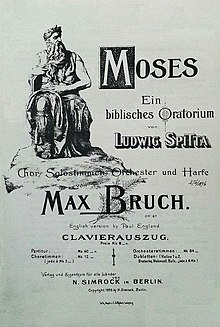Moses (break)
Moses, op. 67 is an oratorio by Max Bruch . It is based on the biblical figure Moses .
Emergence
Bruch had the first plans for the oratorio as early as 1889. However, the actual work did not begin until 1894 after Bruch had established himself in Berlin. The theologian Ludwig Spitta, brother of the musicologist Philipp Spitta , began working on a libretto in early 1894.
On January 19, 1895, Moses was premiered in Barmen under Bruch's direction .
action
The oratorio is divided into four parts. The action begins with Moses' stay on Mount Sinai , where he receives the Ten Commandments (1st part). In the meantime, the people worship the golden calf , to which Moses reacts with anger after his return (part 2). Israelite scouts spy out the land on the border with Canaan ; a little later there is a battle against the Amalekites (3rd part). Moses, who led the Israelites through the desert, dies before crossing the Jordan into the Promised Land (4th part).
effect
After further performances in 1896 in Bonn, Düsseldorf, Schwerin, on May 7, 1896 for the bicentenary of the Berlin Academy under Joseph Joachim and in Gotha, Moses disappeared from the repertoire. Another performance took place on February 6, 1896 in Baltimore.
Bruch considered Moses an advance in his compositional style. In the opinion of Bruch biographer Christopher Fifield , the opposite is more the case. Bruch himself was of the opinion that the disappearance of the oratorio from the repertoire was due to the performance under Joseph Joachim and his "incredible inability as a choir and mass conductor".
literature
- Christopher Fifield: Max Bruch. Biography of a composer . From d. Engl. By Renate Maria Wendel, Schweizer Verlagshaus, 1990 Zurich, ISBN 3-7263-6616-4 , pp. 248-251
Web links
- Moses : Sheet Music and Audio Files in the International Music Score Library Project
Individual evidence
- ^ Bruch to Simrock, February 13, 1895
- ↑ Christopher Fifield: Max Bruch. Biography of a composer. From d. Engl. By Renate Maria Wendel, Schweizer Verlagshaus, 1990 Zurich, ISBN 3-7263-6616-4 , p. 252
- ^ Bruch to Simrock, February 1, 1898
